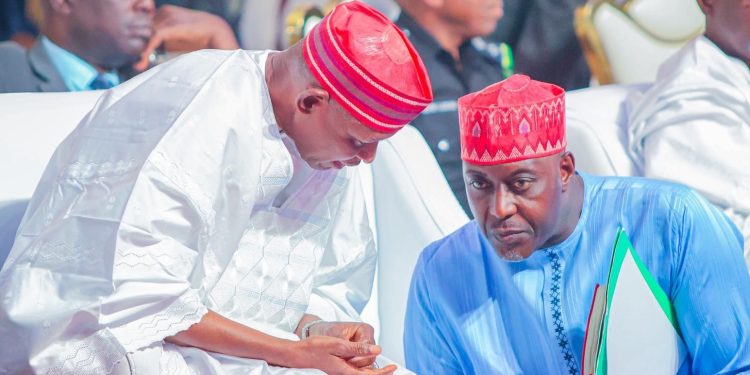Kano State has been thrust into the national spotlight after shocking revelations linked Abdullahi Rogo, the Director-General of Protocol to the Governor, to a massive ₦6.5 billion corruption scandal. The case, now at the center of high-stakes legal and political drama, is under active investigation by Nigeria’s foremost anti-graft agencies—the Independent Corrupt Practices and Other Related Offences Commission (ICPC) and the Economic and Financial Crimes Commission (EFCC).
Billions Under Scrutiny
Investigators allege that Mr. Rogo orchestrated a scheme to divert and launder billions belonging to the Kano State Government. According to ICPC filings, he allegedly deployed front companies, bureau de change operators, and personal accounts to siphon public funds.
So far, the ICPC has confirmed the recovery of ₦1.3 billion connected to Rogo, with funds traced to companies such as H&M Nigeria Limited, A.Y. Maikifi Petroleum, and Ammas Oil and Gas Limited. The agencies insist that these are only fragments of a much larger pool of illicit transactions.
ALSO READ: BREAKING: Bayelsa on Edge as Gunmen Strike
In a significant legal milestone, the Federal High Court in Kano issued a final forfeiture order on July 2, 2025, handing the Federal Government control over ₦142 million traced to one of the laundering channels.
The Web of Front Companies
Court documents and ICPC disclosures allege that A.Y. Maikifi Petroleum and Ammas Oil and Gas siphoned ₦1.17 billion, which was converted into U.S. dollars through bureau de change operators and allegedly delivered in cash to Rogo. Of that sum, ₦1.1 billion has been recovered into the ICPC recovery account.
Further investigations spotlighted AH Bello Business Solutions Ltd, which prosecutors described as a laundering channel disguised as a corporate account. Though registered under Abdullahi Bello, MD of Ammas Petroleum, investigators claim the account was secretly operated by Rogo.
Between August 2024 and February 2025, the account processed ₦3.07 billion in inflows and ₦2.6 billion in withdrawals, leaving a balance of ₦142.2 million, which was later forfeited to the government.
Rogo’s personal finances also raised red flags. His Zenith Bank account reportedly received ₦2.28 billion in deposits and saw ₦2.26 billion in withdrawals, while another corporate account in his name handled ₦54.1 million. Both accounts have since been frozen under Post No Debit (PND) directives.
Court Battles Begin
As the investigations intensified, Rogo fired back. On February 20, 2025, he filed a suit at the High Court of Kano State, Bichi Judicial Division, accusing both the ICPC and EFCC of harassment, intimidation, and “double jeopardy.”
Rogo argued that having already honored an EFCC invitation and secured administrative bail, it was unconstitutional for the ICPC to summon him again on the same allegations. He accused the agencies of disrupting his official duties and sought ₦20 million in damages, plus ₦2 million in legal costs.
ICPC and EFCC Defend Their Actions
Both agencies dismissed Rogo’s claims, insisting they were conducting lawful investigations.
The ICPC, in a counter-affidavit, argued that invitations to account for suspicious transactions do not constitute harassment. They maintained that Rogo was obstructing due process in a case involving fraud, conspiracy, and money laundering.
The EFCC also urged the court to throw out the suit, branding it “frivolous.” Citing the 1999 Constitution and the EFCC Act, the commission argued that being under investigation is not a breach of rights but a legal consequence of reasonable suspicion of crime.
The Court’s Ruling and Aftermath
In a surprising twist, Justice Musa Ahmad of the Kano High Court delivered judgment on August 18, 2025, siding with Rogo.
Although the court acknowledged that his rights had not yet been directly violated, the judge ruled that the overlapping summons and threats of arrest by both agencies created a “likelihood of breach.” The court subsequently restrained the ICPC from further investigation, declared its invitation unlawful, and awarded ₦2 million in costs to Rogo.
The decision has been met with controversy, with civil society groups warning that it risks emboldening corrupt officials. The ICPC has already vowed to appeal, insisting that the judgment shields a powerful figure from accountability.
A Case That Could Redefine Anti-Corruption Battles
The unfolding saga has cast a shadow on Kano State’s leadership and raised fresh questions about Nigeria’s anti-corruption drive. Analysts warn that if the case collapses, it could deal a serious blow to the credibility of both the ICPC and EFCC, while reinforcing the perception that politically connected officials enjoy immunity from justice.
For now, the nation watches closely as appeals loom and investigators push to unearth the full extent of the alleged ₦6.5 billion fraud.


